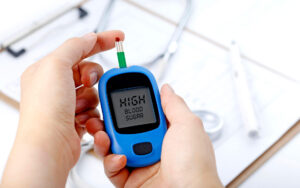Diabetes is a chronic condition that affects how your body regulates blood sugar (glucose) levels. It occurs when your body either doesn’t produce enough insulin or cannot effectively use the insulin it produces. Insulin is a hormone that helps transport glucose from the bloodstream into cells, where it is used for energy.
As you know, there are three main types of diabetes:
1.Type 1 diabetes typically develops in childhood or early adulthood and requires insulin injections for proper blood sugar control.
2. Type 2 diabetes which is more common, usually develops later in life and can often be managed with lifestyle changes, oral medications, or insulin if needed.
3. Gestational diabetes occurs during pregnancy and usually resolves after childbirth.
Common symptoms of diabetes include blurry vision, excessive thirst, fatigue, frequent urination, increased hunger, slow-healing wounds and unexplained weight loss. However, some people may experience no symptoms or have mild symptoms that go unnoticed.
Preventing and Managing Heart Disease, Kidney Disease, and More
If you have diabetes you are at an increased risk of developing various complications, including heart disease, kidney disease, and more. However, by implementing preventive measures and effective management strategies, you can minimize these risks. Here are key steps for preventing and managing complications associated with diabetes:
1. Heart Disease Prevention
- Adopt a heart-healthy diet low in saturated and trans fats, cholesterol, and sodium
- Engage in regular physical activity to improve cardiovascular health
- Quit smoking and limit alcohol consumption
- Monitor blood pressure and cholesterol levels regularly
- Manage blood sugar levels within the target range



2. Kidney Disease Management
- Maintain good blood sugar control through diet, medication, and regular monitoring
- Control blood pressure with lifestyle modifications and prescribed medications
- Limit salt intake to help manage blood pressure
- Stay hydrated and avoid excessive alcohol consumption
- Regularly monitor kidney function with urine and blood tests



3. Eye Health and Vision Care
- Undergo regular eye exams to detect and manage diabetic retinopathy, a common eye complication
- Control blood sugar levels and blood pressure to prevent or slow down the progression of diabetic eye diseases
- Protect eyes from excessive sun exposure by wearing sunglasses


4. Nerve Damage Prevention
- Maintain stable blood sugar levels through medication, diet, and lifestyle adjustments
- Practice good foot care by inspecting feet daily, wearing comfortable footwear, and moisturizing dry skin
- Manage blood pressure and cholesterol levels effectively
- Avoid excessive alcohol consumption


5. Mental Well-being
- Seek support from healthcare professionals or therapists to manage diabetes-related stress and emotional challenges
- Practice stress reduction techniques such as mindfulness, meditation, or engaging in hobbies
- Maintain a strong support system through family, friends, or support groups


Remember, proactive management of diabetes, regular monitoring, adherence to treatment plans, and healthy lifestyle choices are key to preventing and managing your complications. By prioritizing comprehensive care, you can optimize your overall health and well-being.
“Take charge of your well-being if you have diabetes.”










